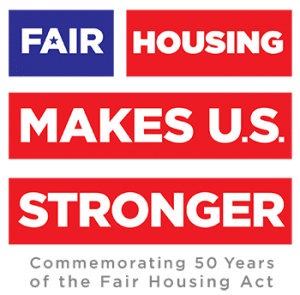 A MESSAGE FROM THE NEW YORK STATE DIVISION OF HUMAN RIGHTS:
A MESSAGE FROM THE NEW YORK STATE DIVISION OF HUMAN RIGHTS:
The Fair Housing Act applies to nearly all types of housing, with very few exceptions. In total, there are seven federally protected classes:
- Race
- Color
- National origin
- Religion
- Sex (a 2021 Executive Order includes sexual orientation and gender identity protections)
- Familial status
- Disability
In addition to these protected classes, New York state fair housing law identifies the following protected classes:
- Creed
- Age
- Marital status
- Military status
- Domestic violence survivor status
- Sexual orientation
- Gender identity and expression
- Source of income
- Lawful source of income
- Immigration status (2023)
- Citizenship (2023)
The Human Rights Law does not give preference to any one particular race, creed, color, national origin, sex, age, lawful source of income, disability, marital status, family status, sexual orientation, or gender identity or expression. If someone denies you housing based on one of these characteristics, whichever characteristic that happens to be, it is against the law.
Who Must Follow The Law?
Anyone who sells, rents, or leases housing must follow the Human Rights Law. This includes: owners, tenants, subtenants, managing agents, real estate brokers, real estate agents, and agents and employees of the above persons.
What Is Prohibited?
The Human Rights Law makes it illegal to discriminate in the sale, rental, or leasing of housing because of a protected characteristic. Specifically, the law makes it illegal to do the following because of a protected characteristic:
- Refuse to sell, rent, or lease housing.
- Discriminate in the terms, conditions, or privileges in the sale, rental, or leasing of housing.
- Discriminate in providing facilities or services in connection with the sale, rental, or leasing of housing.
- Print or circulate a statement, advertisement, or publication expressing a limitation, specification, or discrimination in the sale, rental, or leasing of housing.
- Use an application for housing that expresses any limitation, specification, or discrimination in the sale, rental, or leasing of housing.
- Make any record or inquiry in connection with the prospective purchase, rental, or lease of a housing accommodation that expresses any limitation, specification, or discrimination.
- Discriminate against a person with a visual impairment because of their use of a guide dog, or a person with a hearing impairment because of their use of a hearing dog.
- Discriminate against a person with a disability because of their use of a service dog.
- Discriminate against a person with a disability because of their use of an emotional support animal.
The Human Rights Law also prohibits participating in discrimination or retaliation against someone for helping to enforce the law.
The Human Rights Law adds additional obligations on real estate brokers, real estate salespersons, and their employees. Specifically, it is against the law for them to:
- Refuse to negotiate for the sale, rental, or leasing of housing.
- Represent that housing is not available for sale, rental, or lease when it is available.
Reasonable Accommodation
In addition to prohibiting discrimination on the basis of disability, the Human Rights Law requires persons covered by the law to undertake efforts to accommodate the needs of persons with disabilities so they can live in housing.
What Housing Is Covered?
The Human Rights Law applies to nearly all housing accommodations. Exceptions are:
- Rental units in two-family homes occupied by the owner.
- Rentals in rooming houses occupied by the owner or member of the owner’s family.It is important to remember that although the Human Rights Law does not apply to these housing accommodations, federal or local Fair Housing laws may apply.
What About Lending?
The law also prohibits discrimination in connection with lending, including real estate lending. It is unlawful to discriminate in connection with lending on the basis of the same characteristics that are protected in connection with the sale or rental of housing.
Some Examples:
- You are seeking to sell your co-op unit. The co-op board informs you that it will not approve a sale to African-American buyers. Is this against the law?
Yes. It is unlawful to aid, abet, incite, compel or coerce someone to violate the Human Rights Law. Additionally, should the co-op board actually vote to deny a sale because a buyer is African-American, the co-op would be liable directly for discrimination, as would each member of the board who voted to deny.
- Ms. Booth, a single woman with two children, is looking for an apartment. She sees an advertisement describing a two-bedroom apartment that meets her family’s needs. Ms. Booth calls the listed real estate agent, who tells her that the apartment is available and invites her to come see it. After viewing the apartment, she tells the agent that it is perfect for her family. The agent then tells Ms. Booth that the landlord does not wish to rent to families with children. Did the agent violate the law?
Yes, it is unlawful to refuse to negotiate for the sale, rental, or leasing of housing to families with children.
- You rent an apartment in an apartment building and you use a wheelchair to enter and exit your apartment. You cannot get up the steps at the front of the building without the assistance of others. Do you have any options?
Yes. Your landlord may be required to provide a ramp or other reasonable means to permit you to access the building.
Filing a Complaint
If you believe that you have been denied housing due to unlawful discrimination, you can file a complaint with the New York State Division of Human Rights. A complaint must be filed with the Division within one year of the alleged discriminatory act. To file a complaint:
- Download a complaint form. Completed complaints must be signed before a notary public, and returned to the Division (by mail, email, fax, or in person).
- Stop by a Division office in person. Notary services are available at the Division free of charge.
- Contact one of the Division’s offices, by telephone or by mail, to obtain a complaint form and/or other assistance in filing a complaint.
- For more information or to find the regional office nearest to your home or place of employment, visit: www.dhr.ny.gov/contact-us.
FAIR HOUSING LINKS
Fair Housing under the New York State Human Rights Law (Trifold Brochure)
Source of Income Discrimination in Housing (Trifold Brochure)
Housing Rights of People with Disabilities (Trifold Brochure)
Housing Discrimination Complaint Form (Fillable PDF)
Housing and Anti-Discrimination Disclosure Form (HADF)
Fair Housing Notice
Fair Housing Regulation




